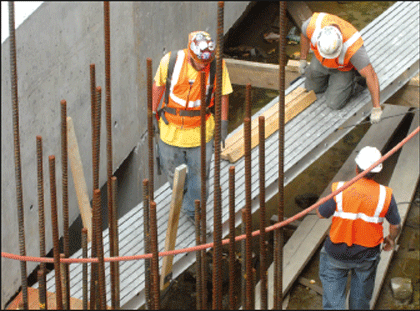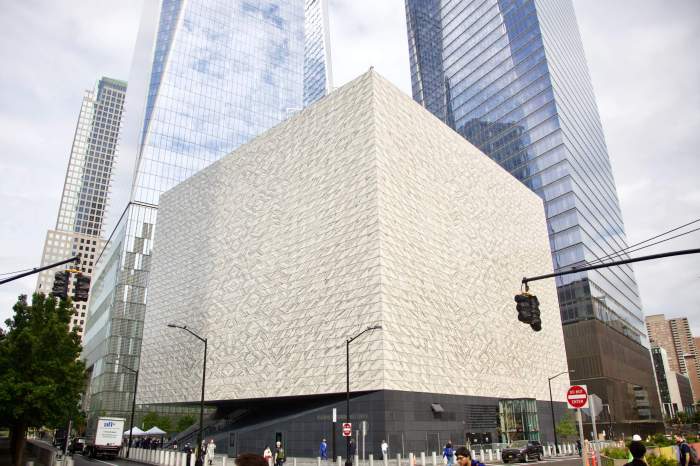By Josh Rogers
Port Authority officials said this week that World Trade Center construction progress is proceeding rapidly but they may have to go to a 24-hour schedule to avoid paying developer Larry Silverstein $300,000 a day in fines if they miss a January deadline.
“As we ramp up the project, [construction work] could be 24 hours a day,” Steve Coleman, a Port spokesperson, said during a press tour and briefing of the W.T.C. site on Wednesday, six days shy of the six-year anniversary of the terror attack.
Over 500 Port employees and contractors are working at the W.T.C. on the memorial, train station, Freedom Tower and “eastern bathtub,” which is needed to build three office towers on Church St. If the bathtub is not finished for the Tower 3 and 4 sites at the south end of Church St. by Jan. 1, the Port will begin paying Silverstein $300,000 a day under the renegotiated long-term lease the two parties signed a year ago.
During a tour of the site in May, Anthony Shorris, the Port’s executive director, said of the Silverstein deadline: “That’s what we lose a lot of sleep over-delivering the site on time.”
One person who has been losing sleep lately is Pat Moore, who lives across the street from the site at 125 Cedar St. Moore said on the Sunday morning after last month’s deadly Deutsche Bank fire, she was jarred awake at 5:45 a.m. as her building shook from the W.T.C. bathtub work across the street. Later in the morning she spoke with Gov. Eliot Spitzer who was right outside her window checking the air monitors and assuring her that everything was safe.
Moore, a Community Board 1 member, said that the early morning work had started about a month before the fire. A Port official had called her a week or two after it began to inform her and her neighbors about the early work and the Silverstein time pressures.
“You know I don’t care,” Moore said. “That’s not my problem.”
More recently, work has been getting started at 7 a.m. “Those two hours make a big difference,” Moore said.
Coleman said this week it’s not clear yet when there could be round the clock work.
This week’s visit to the site revealed visible progress on all four major projects on the site compared to the Downtown Express tour in May.
“We are now finally pumping every piston in the project,” Shorris said Wednesday. He said they are still on schedule to turn over sites 3 and 4 to Silverstein in January, open the train station and part of the memorial plaza in 2009, and the Freedom Tower in 2012.
The train station will cost more than the $2.2. billion originally budgeted, Shorris said. Architect and engineer Santiago Calatrava is now shaving costs off the design through engineering efficiencies, and is not making any major changes to the design, Shorris added. Of all the W.T.C. proposals, Calatrava’s design has probably received the highest raves from residents and critics. Shorris said the final cost will go up, but he won’t know the amount for a few months.
He hopes to keep the memorial costs down. “We’re working on the costs to keep it on budget,” he said. The current estimate to build the memorial block is $768 million.
The Port currently owns the memorial site and the rest of the W.T.C., but at some point, it may transfer the memorial land to the W.T.C. Memorial Foundation in exchange for the Deutsche Bank site and an adjacent parcel, where a vehicle security center, tour bus garage, an office tower for JPMorgan Chase, a Greek Orthodox church and a public plaza are planned.
Early this year, officials hoped to be able to finish dismantling the Deutsche building by the end of this year, in which case the bus garage would not have been finished until two years after tour buses were expected to begin swarming the memorial. The fire has pushed back the Deutsche demolition indefinitely, thus extending the so-called “bus gap” time period.
Shorris said the Port is not thinking of slowing down any work to wait for the garage, but is constantly adjusting the sequencing of construction as new problems arise every day. He likened it to conducting an orchestra. The payoff will come at the end when the construction is finished, he added.
“This thing is moving, “ he said. “It is being conducted and this thing will make great music someday.”


















